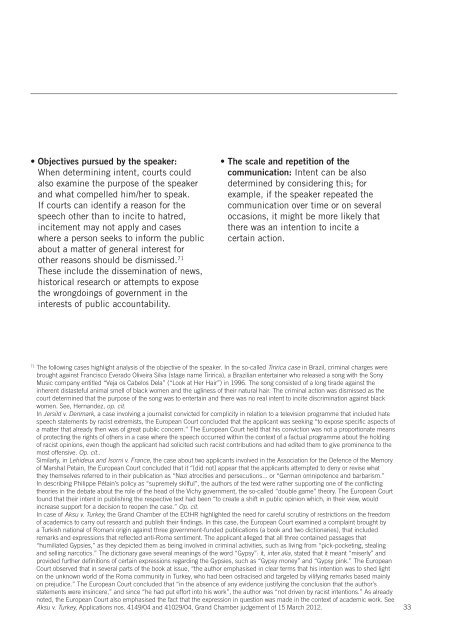ARTICLE-19-policy-on-prohibition-to-incitement
ARTICLE-19-policy-on-prohibition-to-incitement
ARTICLE-19-policy-on-prohibition-to-incitement
You also want an ePaper? Increase the reach of your titles
YUMPU automatically turns print PDFs into web optimized ePapers that Google loves.
• Objectives pursued by the speaker:<br />
When determining intent, courts could<br />
also examine the purpose of the speaker<br />
and what compelled him/her <strong>to</strong> speak.<br />
If courts can identify a reas<strong>on</strong> for the<br />
speech other than <strong>to</strong> incite <strong>to</strong> hatred,<br />
<strong>incitement</strong> may not apply and cases<br />
where a pers<strong>on</strong> seeks <strong>to</strong> inform the public<br />
about a matter of general interest for<br />
other reas<strong>on</strong>s should be dismissed. 71<br />
These include the disseminati<strong>on</strong> of news,<br />
his<strong>to</strong>rical research or attempts <strong>to</strong> expose<br />
the wr<strong>on</strong>gdoings of government in the<br />
interests of public accountability.<br />
• The scale and repetiti<strong>on</strong> of the<br />
communicati<strong>on</strong>: Intent can be also<br />
determined by c<strong>on</strong>sidering this; for<br />
example, if the speaker repeated the<br />
communicati<strong>on</strong> over time or <strong>on</strong> several<br />
occasi<strong>on</strong>s, it might be more likely that<br />
there was an intenti<strong>on</strong> <strong>to</strong> incite a<br />
certain acti<strong>on</strong>.<br />
71<br />
The following cases highlight analysis of the objective of the speaker. In the so-called Tiririca case in Brazil, criminal charges were<br />
brought against Francisco Everado Oliveira Silva (stage name Tiririca), a Brazilian entertainer who released a s<strong>on</strong>g with the S<strong>on</strong>y<br />
Music company entitled “Veja os Cabelos Dela” (“Look at Her Hair”) in <str<strong>on</strong>g>19</str<strong>on</strong>g>96. The s<strong>on</strong>g c<strong>on</strong>sisted of a l<strong>on</strong>g tirade against the<br />
inherent distasteful animal smell of black women and the ugliness of their natural hair. The criminal acti<strong>on</strong> was dismissed as the<br />
court determined that the purpose of the s<strong>on</strong>g was <strong>to</strong> entertain and there was no real intent <strong>to</strong> incite discriminati<strong>on</strong> against black<br />
women. See, Hernandez, op. cit.<br />
In Jersild v. Denmark, a case involving a journalist c<strong>on</strong>victed for complicity in relati<strong>on</strong> <strong>to</strong> a televisi<strong>on</strong> programme that included hate<br />
speech statements by racist extremists, the European Court c<strong>on</strong>cluded that the applicant was seeking “<strong>to</strong> expose specific aspects of<br />
a matter that already then was of great public c<strong>on</strong>cern.” The European Court held that his c<strong>on</strong>victi<strong>on</strong> was not a proporti<strong>on</strong>ate means<br />
of protecting the rights of others in a case where the speech occurred within the c<strong>on</strong>text of a factual programme about the holding<br />
of racist opini<strong>on</strong>s, even though the applicant had solicited such racist c<strong>on</strong>tributi<strong>on</strong>s and had edited them <strong>to</strong> give prominence <strong>to</strong> the<br />
most offensive. Op. cit..<br />
Similarly, in Lehideux and Isorni v. France, the case about two applicants involved in the Associati<strong>on</strong> for the Defence of the Memory<br />
of Marshal Petain, the European Court c<strong>on</strong>cluded that it “[did not] appear that the applicants attempted <strong>to</strong> deny or revise what<br />
they themselves referred <strong>to</strong> in their publicati<strong>on</strong> as “Nazi atrocities and persecuti<strong>on</strong>s... or “German omnipotence and barbarism.”<br />
In describing Philippe Pétain’s <str<strong>on</strong>g>policy</str<strong>on</strong>g> as “supremely skilful”, the authors of the text were rather supporting <strong>on</strong>e of the c<strong>on</strong>flicting<br />
theories in the debate about the role of the head of the Vichy government, the so-called “double game” theory. The European Court<br />
found that their intent in publishing the respective text had been “<strong>to</strong> create a shift in public opini<strong>on</strong> which, in their view, would<br />
increase support for a decisi<strong>on</strong> <strong>to</strong> reopen the case.” Op. cit.<br />
In case of Aksu v. Turkey, the Grand Chamber of the ECtHR highlighted the need for careful scrutiny of restricti<strong>on</strong>s <strong>on</strong> the freedom<br />
of academics <strong>to</strong> carry out research and publish their findings. In this case, the European Court examined a complaint brought by<br />
a Turkish nati<strong>on</strong>al of Romani origin against three government-funded publicati<strong>on</strong>s (a book and two dicti<strong>on</strong>aries), that included<br />
remarks and expressi<strong>on</strong>s that reflected anti-Roma sentiment. The applicant alleged that all three c<strong>on</strong>tained passages that<br />
“humiliated Gypsies,” as they depicted them as being involved in criminal activities, such as living from “pick-pocketing, stealing<br />
and selling narcotics.” The dicti<strong>on</strong>ary gave several meanings of the word “Gypsy”: it, inter alia, stated that it meant “miserly” and<br />
provided further definiti<strong>on</strong>s of certain expressi<strong>on</strong>s regarding the Gypsies, such as “Gypsy m<strong>on</strong>ey” and “Gypsy pink.” The European<br />
Court observed that in several parts of the book at issue, “the author emphasised in clear terms that his intenti<strong>on</strong> was <strong>to</strong> shed light<br />
<strong>on</strong> the unknown world of the Roma community in Turkey, who had been ostracised and targeted by vilifying remarks based mainly<br />
<strong>on</strong> prejudice.” The European Court c<strong>on</strong>cluded that “in the absence of any evidence justifying the c<strong>on</strong>clusi<strong>on</strong> that the author’s<br />
statements were insincere,” and since “he had put effort in<strong>to</strong> his work”, the author was “not driven by racist intenti<strong>on</strong>s.” As already<br />
noted, the European Court also emphasised the fact that the expressi<strong>on</strong> in questi<strong>on</strong> was made in the c<strong>on</strong>text of academic work. See<br />
Aksu v. Turkey, Applicati<strong>on</strong>s nos. 4149/04 and 41029/04, Grand Chamber judgement of 15 March 2012.<br />
33


